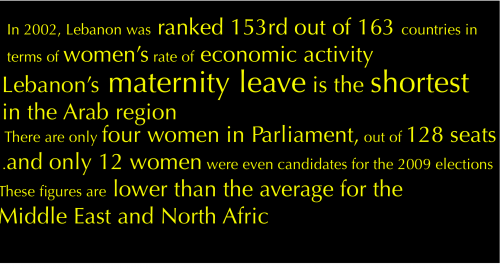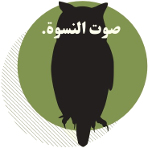
Almost everytime you talk to a Lebanese man about women’s rights, the typical response is: “Women’s right in Lebanon? It’s men who should be asking for their rights nowadays!”
It was my impression that most women find that level of analysis fairly insulting. So two days ago, I wandered around AUB’s campus to hear what female students think about their rights as women in Lebanon.
Apparently, we, the Lebanese people, are very liberal and open-minded. We are the Switzerland of the Middle East. Our country is a free country where everybody is treated equally and with respect. So, what do we have to say about the fact that one migrant worker is found dead every week? Unfortunately for them, they are not Lebanese.
Moreover, I was told, Lebanese women have all the rights they need. What about the law that prevents women from giving their nationality to their husband and kids? We don’t need it because who would want to marry a NON-Lebanese anyway? (ewww)
Indeed, women are very equal to men in Lebanon. For example, in engineering classes, the female students are often ignored. “When my classmates look at me, I can see their eyes asking: ‘What is she doing here? Shouldn’t she be in a Biology or Nutrition class?’” says Rania Feghali, a 19 year-old girl majoring in computer engineering at AUB. “Every time the professor asks a question, he doesn’t expect us girls to answer,” added Samira, 21.
It is said that women have no limits in our country, except that they don’t know how to drive, and they certainly shouldn’t walk in the streets alone at night. Amani Fakih, a 20 year-old studying nursing at AUB, is tired – surprisingly? – of all the judgments and limitations women endure everyday. “When I told my friends I wanted a motorcycle, they started laughing at me and told me that women must learn how to drive a car before starting to think about buying a motorcycle.” She continued, frustrated, “I’m sick of men offering to park my car for me!”
Moreover, I was so excited to hear, women should not complain about being verbally harassed on the streets every day. It is a merely new type of flirting and, as such, they should enjoy it. “Women like it, it increases their self confidence,” claims Fatima, a 21 years-old chemistry major at AUB. “Anyway, toltish is in the men’s blood. They can’t control it and it’s not harming anybody,” she adds, clearly concluding this from her chemistry and biology classes, I’m guessing. Zeina Haidar, who had to end her internship because of the verbal abuse leveled at her every day, must strongly agree with Fatima.
At first, I was gratified to hear that women are denied the same job opportunities as men in Lebanon, until Rawan Hakawati, also a Chemistry major in AUB, explained to me all the reasons for this discrimination. “This is due to the fact that women physically and biologically are different from men. Consequently, a woman should not be aiming for the same jobs as men. Personally, I wouldn’t trust a female doctor and I wouldn’t want to see women in the army!” She turns her head and looks at her friend who is a premedical student. “Don’t worry, you can work with kids or something.” Her friend, like myself, felt immediately better.
Women, I was told again and again, are treated with respect and admiration in our country. Nothing stands between them and their ambitions except, of course, if their ambitions don’t include getting married or taking care of their kids and their husband.
Finally, I found Yara Kfouri, 19 years old and majoring in English Linguistics, who tells it like it is: “We live in a patriarchal society, where everything is controlled by men. Women can’t have custody over their children in case they want to divorce. Honor killing is still legal while it should be banned completely. We need to make some real changes here. We claim to be an educated society, everyone is highly educated and yet we have such a backwards way of life!”
Yara is right; we are an extremely educated society: 18 out 20 women I interviewed had not heard of the nationality law and didn’t know that toltish is a type of sexual harassment.
But yes, we are very educated when it comes to fashion, to the latest plastic surgeries that can be done, to where to go out at night and what cars to drive. However, we don’t consider it crucial to know about our rights, our laws and the difference between stereotypes and facts.
In other words, Lebanese women are equal in all that matters. We shouldn’t be bothered by all these little things. Having less political power, money and rights shouldn’t worry us. It’s not disturbing for a lot of Lebanese men, so why should it disturb us – right?
Publisher:
Section:
Category:






